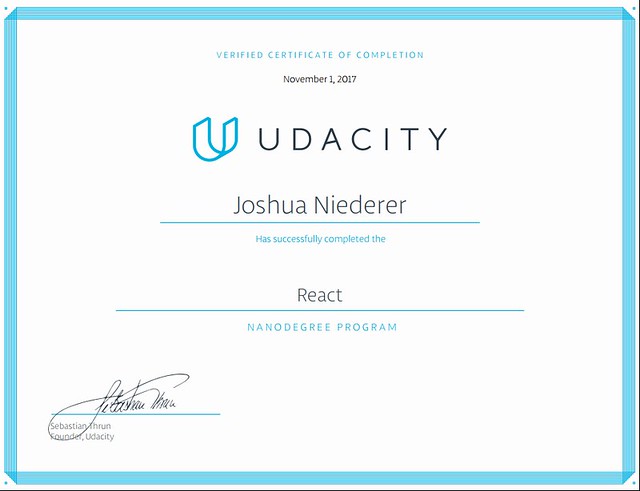Finished React Nanodegree
Last night, at 10:26 PM, I submitted my final project Udacity’s React Nanodegree. At 11:21 PM, less than an hour later, I had confirmation back that the project met the program’s specifications and I was done with the React Nanodegree. I plan to do a deeper post about the program and learning platform before the end of the year. For now, I want to write out a few thoughts about the experience.
The course content is decent, but I feel that the Udemy, specifically the courses by Stephan Grider, has better courses. The second section of the program, which covers React and Redux, is the low point. From a course content standpoint alone, Udacity’s retail price of $500 would not be close to worth it.
Where the React Nanodegree shines is in the projects. There are three hands-on projects required to complete the program. I’d estimate that I spent 5-10 hours on the first project, 20-40 on the second project, and 10-20 on the third project. Each project gets a thorough code review and comes with recommendations about what can be improved. The reviewers will also include links for further research.
Overall, the React Nanodegree was a good experience. It definitely pushed me to learn React. Laying down the $300 (I got it during a summer sale) required to take the course forced me to commit where I otherwise might not have. This alone probably made the program a worthwhile purchase.

Projects from the React Nanodegree Program
I used GitHub to host each of my projects from the course. Feel free to take a look.
- myreads - A project displaying the understanding of basic React concepts like components, state, and React Router. The web app allows users to move books from shelf to shelf based on their current interest with the book.
- readable - A more in depth web application which utilizes React and Redux. The web app provides functionality for users to post links, vote on content, and comment on each post. The application supports Markdown for all long form text entries by using the Remarkable package.
- MobileFlashcards - MobileFlashcards covers React Native. The application allows users to create decks with cards that consist questions and answers. Users can quiz themselves over the material from the cards. The app runs on both Android and iOS devices.